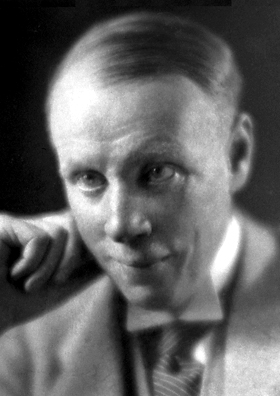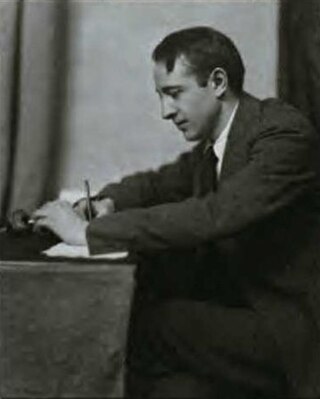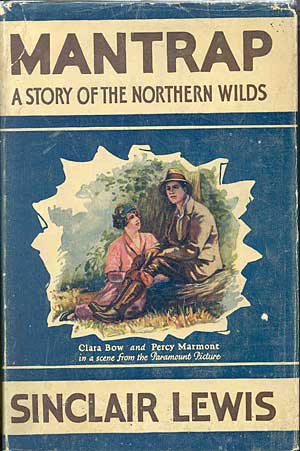
Harry Sinclair Lewis was an American novelist, short-story writer, and playwright. In 1930, he became the first author from the United States to receive the Nobel Prize in Literature, which was awarded "for his vigorous and graphic art of description and his ability to create, with wit and humor, new types of characters." Lewis wrote six popular novels: Main Street (1920), Babbitt (1922), Arrowsmith (1925), Elmer Gantry (1927), Dodsworth (1929), and It Can't Happen Here (1935).

Elmer Gantry is a satirical novel written by Sinclair Lewis in 1926 that presents aspects of the religious activity of the United States in fundamentalist and evangelistic circles and the attitudes of the 1920s public toward it. Reverend Dr. Elmer Gantry, the protagonist, is attracted by drinking, making easy money and chasing women. After various forays into smaller, fringe churches, he becomes a major moral and political force in the Methodist Church despite his hypocrisy and serial sexual indiscretions.

It Can't Happen Here is a 1935 dystopian political novel by American author Sinclair Lewis. Set in the fictionalized version of 1930s United States, it follows an American politician, Berzelius "Buzz" Windrip, who quickly rises to power to become the country's first outright dictator and Doremus Jessup, a newspaper editor who sees Windrip's fascist policies for what they are ahead of time and who becomes Windrip's most ardent critic. The novel was adapted into a play by Lewis and John C. Moffitt in 1936.

Babbitt (1922), by Sinclair Lewis, is a satirical novel about American culture and society that critiques the vacuity of middle class life and the social pressure toward conformity. The controversy provoked by Babbitt was influential in the decision to award the Nobel Prize in Literature to Lewis in 1930. The novel has been filmed twice, once as a silent in 1924 and remade as a talkie in 1934.

Arrowsmith is a novel by American author Sinclair Lewis, first published in 1925. It won the 1926 Pulitzer Prize. Lewis was greatly assisted in its preparation by science writer Paul de Kruif, who received 25% of the royalties on sales, although Lewis was listed as the sole author.

Twice-Told Tales is a short story collection in two volumes by Nathaniel Hawthorne. The first volume was published in the spring of 1837 and the second in 1842. The stories had all been previously published in magazines and annuals, hence the name.

Leonard Alfred George Strong was a popular English novelist, critic, historian, and poet, and published under the name L. A. G. Strong. He served as a director of the publishers Methuen Ltd. from 1938 to 1958.

Shish kebab or shish kebap is a popular meal of skewered and grilled cubes of meat. It can be found in Mediterranean cuisine and is similar to or synonymous with dishes called shashlik and khorovats, found in the Caucasus region.

Floyd James Dell was an American newspaper and magazine editor, literary critic, novelist, playwright, and poet. Dell has been called "one of the most flamboyant, versatile and influential American Men of Letters of the first third of the 20th Century." In Chicago, he was editor of the nationally syndicated Friday Literary Review. As editor and critic, Dell's influence is seen in the work of many major American writers from the first half of the 20th century. A lifelong poet, he was also a best-selling author, as well as a playwright whose hit Broadway comedy, Little Accident (1928), was made into a Hollywood movie.

Kingsblood Royal is a 1947 novel by American writer Sinclair Lewis.
"All in the golden afternoon" is the preface poem in Lewis Carroll's 1865 book Alice's Adventures in Wonderland. The introductory poem recalls the afternoon that he improvised the story about Alice in Wonderland while on a boat trip from Oxford to Godstow, for the benefit of the three Liddell sisters: Lorina Charlotte, Alice Pleasance, and Edith Mary. Alice gave her name to Carroll's main character.

Frederick Abbott Stokes was an American publisher, founder and long-time head of the eponymous Frederick A. Stokes Company.

The "Genius" is a semi-autobiographical novel by Theodore Dreiser, first published in 1915. The story concerns Eugene Witla, a talented painter of strong sexual desires who grapples with his commitment to his art and the force of his erotic needs. The book sold 8,000 copies in the months immediately following publication but encountered legal difficulties when it was declared potentially obscene. Dreiser's publisher was nervous about continuing publication and recalled the book from bookstores, and the novel did not receive broad distribution until 1923. When The "Genius" was reissued by a different publisher, the firm of Horace Liveright, it immediately sold more than 40,000 copies.

The Ashley Library is a collection of original editions of English poets from the 17th century onwards, including their prose works as well as those in verse, collected by the bibliographer, collector, forger, and thief Thomas James Wise. The library was sold to the British Museum by his widow, Frances Louise Greenhaigh Wise, in 1937 for £66,000. It was named after the street in which Wise lived when he started the collection.
In book-collecting as in other things, the sum of all is that what interests you is what concerns you. Now to this end and purpose alone I also hold the Ashley Library to be wonderful, but it has an added wonder in that it reveals so exquisite a discrimination and so great a reverence for our masterpieces of literature... the great catalogue of his life's work and love, which is in effect a history of English literature during the last 300 years, may well appear as a blazing star, or an Angel, to his sight.

Mantrap is a 1926 novel by Sinclair Lewis. One of Lewis's two unsuccessful novels of the 1920s, the other being The Man Who Knew Coolidge. Mantrap is the story of New York lawyer Ralph Prescott's journey into the wilds of Saskatchewan, and of his adventures there. The novel spawned two separate film adaptations, Mantrap (1926), and Untamed (1940).
Gordon Young was an American writer of adventure and western stories.

The Man Who Knew Coolidge is a 1928 satirical novel by Sinclair Lewis. It features the return of several characters from Lewis' previous works, including George Babbitt and Elmer Gantry. Additionally, it sees a return to the familiar territory of Lewis' fictional American city of Zenith, in the state of Winnemac. Presented as six long, uninterrupted monologues by Lowell Schmaltz, a travelling salesman in office supplies, the eponymous first section was originally published in The American Mercury in 1927.
Lewis Browne was a writer, philosopher, lecturer and world traveller. A rabbi, Browne turned to writing popular histories and biographies including This Believing World (1926), The Graphic Bible, and The Wisdom of Israel (1945). His 1943 novel See What I Mean? was regarded as a counterpart to It Can't Happen Here by Sinclair Lewis, Browne's frequent debate partner on the 1940s lecture circuit. Browne was considered one of the foremost authorities on the problems of comparative religion.
Allan Eugene Updegraff (1883–1965) was an American-born novelist, poet, and editor. After he and his friend, Sinclair Lewis, dropped out of Yale during his junior year, he made a living working odd jobs, as well as writing stories for magazines and newspapers. In 1917 he had his first novel published. He moved to Paris in the mid 1920s, where he lived until his death in 1965. In addition to his six novels, he published poetry, short stories and essays, as well as having a short stint as a book reviewer. He was married twice: after a brief marriage to Edith Summers, which produced two children, he married freelance writer and fashion consultant Dora Loues Miller, who he remained married to for more than forty years, until his death in 1965.
Huey Long, governor of Louisiana and US Senator, has inspired or been portrayed in numerous cultural works. He has served as the template for fascistic politicians in novels like It Can't Happen Here (1935), A Lion Is in the Streets (1945), and All the King's Men (1946). The latter two were adapted into Oscar-winning films.















